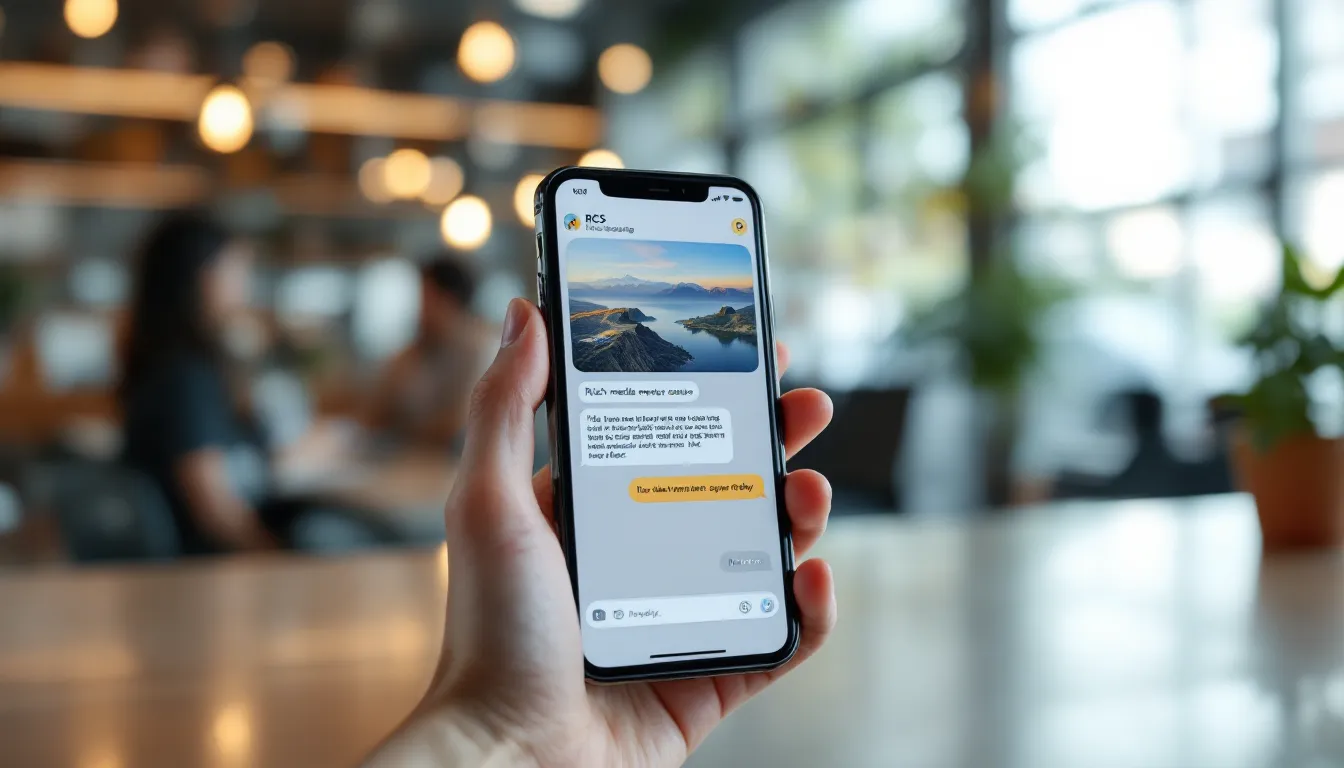5 Ways RCS Messaging Can Eliminate No-Shows and Increase Revenue for Travel Businesses

In an era where customer engagement and streamlined communication are vital for the success of travel businesses, Rich Communication Services (RCS) messaging has emerged as a powerful tool to enhance client interactions and minimize operational challenges. This article explores the significance of RCS messaging, its role in reducing no-shows, and how it can ultimately lead to increased revenue for travel companies.
Understanding RCS Messaging and Its Importance
RCS messaging is a protocol that enables richer and more interactive communication features beyond standard SMS technology. It allows businesses to send multimedia messages, chat, and conduct interactive conversations with customers through their mobile devices. RCS also supports branding elements—like logos and branded backgrounds—that enhance communication efficacy. This capability not only elevates the visual appeal of messages but also reinforces brand identity, making interactions more memorable for consumers.

The importance of RCS messaging cannot be overstated. For travel businesses, it opens up new avenues for service delivery, customer satisfaction, and engagement. As travelers increasingly rely on their mobile devices for information and booking, RCS provides an optimal channel for timely communications that can foster trust and loyalty. Furthermore, the integration of RCS into customer service strategies allows for a seamless transition between automated responses and human agents, ensuring that customer queries are addressed promptly and effectively.
Defining RCS Messaging
RCS messaging facilitates two-way communication between brands and consumers. Unlike traditional SMS, RCS allows for rich content, such as images, carousels, quick reply buttons, and other interactive elements, making the messaging experience more engaging. This richer communication format has positive implications for user experience and business performance alike. For instance, businesses can utilize RCS to create engaging promotional campaigns that not only inform but also encourage immediate action, such as booking a last-minute getaway or participating in a limited-time offer.
With RCS, businesses are no longer limited to plain text; rather, they can create visually appealing messages that capture the attention of travelers. This shift from text to rich media is pivotal in an industry where visual content plays a significant role in decision-making. The ability to showcase stunning images of destinations or highlight unique travel experiences can significantly influence a traveler’s choice, making RCS an essential tool in the competitive travel market.
The Role of RCS Messaging in the Travel Industry
RCS messaging plays a crucial role in the travel industry by enhancing how companies interact with their customers. It allows travelers to receive pertinent information such as flight updates, reservation confirmations, or changes to their travel itineraries in real-time. Additionally, RCS facilitates proactive communication, where businesses can remind customers of upcoming trips and provide helpful tips for their journey. This level of engagement not only keeps travelers informed but also enhances their overall experience, making them feel valued and cared for by the brand.
Moreover, the ability to accumulate data through RCS messaging enables travel businesses to gain insights into customer preferences and behaviors, which can be invaluable for future marketing strategies. Understanding how clients respond to messages can assist travel agencies in tailoring their offerings and communications accordingly. For example, if a customer frequently engages with messages about adventure travel, the agency can personalize future communications to highlight similar experiences, thereby increasing the likelihood of conversion. Additionally, the analytics derived from RCS interactions can help businesses optimize their messaging strategies, ensuring that they deliver the right content at the right time to maximize engagement and satisfaction.
The Impact of No-Shows on Travel Businesses
No-shows can significantly hinder the profitability of travel businesses. When customers fail to show up for flights, tours, or hotel reservations, companies are left with unsold inventory, leading to lost revenue opportunities. Furthermore, no-shows can strain resources as businesses scramble to fill gaps in their schedules and manage customer complaints.
Understanding the full impact of no-shows extends beyond immediate financial losses. The operational challenges posed by frequent no-shows and cancellations can lead to a poor customer experience, increased operational costs, and adverse effects on a company’s reputation.
Financial Implications of No-Shows
When a customer fails to show for a booked service, it can lead to substantial financial losses for travel businesses. According to various industry studies, the cost of no-shows can range from the direct revenue lost on the missed booking to indirect expenses incurred in administrative work, customer service management, and the negative impact on brand reputation.
These financial implications highlight the need for effective communication strategies to ensure customers remain informed and engaged prior to their appointments, encouraging them to follow through on their travel plans. Additionally, implementing flexible booking policies, such as allowing for easy rescheduling or offering incentives for early cancellations, can help mitigate the financial fallout associated with no-shows. By fostering a more accommodating environment, businesses can enhance customer loyalty and reduce the likelihood of future no-shows.
Operational Challenges Due to No-Shows
The operational challenges stemming from no-shows can severely affect a travel business's efficiency. When significant numbers of customers do not appear for booked services, organizations may find themselves overstaffed, leading to wasted resources and personnel costs.
Additionally, logistical disruptions can occur, such as delays in service provision or challenges in managing customer waitlists. As a result, companies not only face immediate fallout from no-shows but also potential long-term damage to their customer relationships. The unpredictability of no-shows can also complicate inventory management, making it difficult for businesses to forecast demand accurately. This uncertainty can lead to overbooking or underutilization of resources, further exacerbating operational inefficiencies. To combat these issues, many companies are turning to data analytics and customer behavior insights to better predict patterns of attendance, allowing them to optimize their scheduling and resource allocation effectively.
How RCS Messaging Can Reduce No-Shows
Implementing RCS messaging can serve as an effective strategy to mitigate the no-show problem that many travel businesses face. By providing travelers with timely updates and facilitating personalized communication, RCS can enhance customer commitment and lower the likelihood of missed appointments.

Real-Time Updates and Reminders
One of the most significant advantages of RCS messaging is the ability to send real-time updates and reminders directly to customers’ phones. Travel companies can set up automated messages to remind clients about upcoming flights, check-in times, and any potential delays.
By ensuring that customers have quick access to crucial information, RCS messaging helps alleviate the potential for confusion or forgetfulness regarding their travel plans. Furthermore, the interactive nature of RCS allows customers to respond to messages, facilitating better communication and allowing businesses to address customer concerns proactively. This two-way communication can also include options for customers to confirm their attendance or make changes to their plans, thus further reducing the chances of no-shows.
Personalized Communication with Customers
Personalization is a key factor in ensuring customer satisfaction, and RCS messaging excels in this area. Travel businesses can tailor their messages based on customer preferences, past travel history, and specific needs. Whether it’s suggesting relevant activities, offering personalized travel packages, or sharing exciting updates about their destination, RCS messaging helps create a more individualized experience.
This personalized approach can markedly enhance the relationship between travel businesses and their customers. People are more likely to honor their travel commitments when they feel valued and understood through custom communication efforts. Additionally, RCS messaging can include rich media elements, such as images or videos of destinations, which can further engage customers and spark excitement about their upcoming trips. By making the communication visually appealing and relevant, businesses can foster a deeper emotional connection with travelers, encouraging them to keep their plans and reducing the likelihood of cancellations.
Increasing Revenue with RCS Messaging
Beyond reducing no-shows, RCS messaging offers vast potential for increasing revenue in the travel industry. By improving customer engagement and creating upselling opportunities, it enables businesses to maximize their revenue streams efficiently.

Enhancing Customer Engagement
Engagement is crucial for building loyalty and generating repeat business. RCS messaging fosters deeper interactions, allowing travel companies to encourage ongoing dialogues with travelers. The ability to showcase destination highlights, new packages, or exclusive deals through rich media messages captures interest and encourages further consideration.
Moreover, the advantage of real-time communication means that when a customer inquires about additional services or upgrades, businesses can respond instantly, facilitating better decision-making at the moment of interest. This immediacy can significantly influence a traveler’s willingness to invest further in their journey. Additionally, personalized messages tailored to individual preferences can enhance the emotional connection between the customer and the brand, leading to a more satisfying experience that encourages future bookings.
Furthermore, RCS messaging allows for the integration of multimedia elements such as videos and interactive maps, providing travelers with immersive content that can spark excitement about their upcoming trips. By sharing engaging stories and visuals about destinations, travel companies can create a sense of anticipation that not only boosts customer engagement but also drives conversions as travelers become more eager to explore and book additional experiences.
Upselling and Cross-Selling Opportunities
RCS messaging can serve as a robust platform for upselling and cross-selling complementary services. For instance, if a traveler books a flight, businesses can immediately offer related services such as travel insurance, car rentals, or hotel accommodations directly through RCS messages.
This not only enhances the traveler’s experience by consolidating their options but also maximizes revenue per customer. The easy-to-use interactive features of RCS enable seamless transaction paths, allowing customers to confirm additional services on the spot, thereby increasing overall sales. Moreover, by analyzing customer data and preferences, businesses can tailor their upselling strategies to align with individual traveler needs, ensuring that the offers presented are relevant and appealing.
In addition, RCS messaging can be utilized to send timely reminders about special promotions or limited-time offers, creating a sense of urgency that can prompt immediate action from customers. For example, if a traveler has shown interest in a specific tour or activity, a well-timed message highlighting a discount or package deal can significantly increase the likelihood of a purchase. This proactive approach not only boosts sales but also reinforces the brand’s commitment to providing value, fostering a positive relationship with the customer that can lead to long-term loyalty.
Implementing RCS Messaging in Your Travel Business
As with any new technology, effectively implementing RCS messaging in a travel business requires planning and consideration. By selecting the right platform and following best practices, travel companies can seamlessly integrate RCS into their communication strategy.
Choosing the Right RCS Messaging Platform
When selecting an RCS messaging platform, travel businesses should assess their needs, budget, and the level of customization required for their operations. An ideal platform should enable the creation and management of interactive campaigns easily while offering robust analytics to track engagement metrics.
Moreover, partnering with established providers who understand the specific challenges and needs of the travel industry will further enhance the implementation process. These providers can help tailor the RCS messaging experience to suit the unique requirements of various travel segments. For instance, a platform that allows for dynamic content delivery can showcase real-time flight updates or personalized travel itineraries, ensuring that customers receive the most relevant information at the right time.
Best Practices for RCS Messaging Implementation
To maximize the effectiveness of RCS messaging, businesses should adhere to several best practices. These include consistently testing message formats to determine what resonates most with customers, utilizing customer data for personalization, and setting up automated workflows for sending reminders and updates.
Additionally, it’s essential to monitor engagement metrics and gather feedback to refine communication strategies continually. Regular training for staff on utilizing RCS messaging features will also ensure the platform is used effectively and to its full potential. It’s also beneficial to establish a feedback loop with customers, allowing them to share their experiences and preferences regarding RCS interactions. This not only helps in fine-tuning messaging strategies but also empowers customers, making them feel valued and heard.
Furthermore, integrating RCS messaging with other marketing channels can amplify its effectiveness. For example, combining RCS with email campaigns or social media promotions can create a cohesive communication strategy that keeps customers informed and engaged across multiple platforms. This multi-channel approach allows travel businesses to reach their audience in various ways, enhancing the overall customer experience and increasing the likelihood of conversions.
Take Your Travel Business to New Heights with nativeMsg
Ready to elevate your customer engagement and slash those no-show rates? nativeMsg is your go-to RCS Business Messaging Creator, enabling you to transform ordinary texting into captivating, interactive experiences. With our easy-to-use drag-and-drop interface, you can craft personalized messages that resonate with travelers and boost your revenue. Don't miss out on the opportunity to enhance your communication strategy and create lasting impressions. Get Started today and watch your travel business soar!
